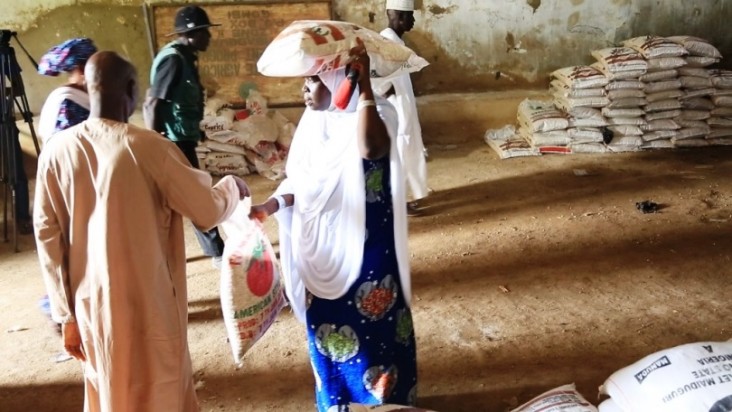
August 2016—Aisha M.* was home with her husband and children in Gombi, northeast Nigeria, the day they heard that that Boko Haram was coming. The family left the village that same day, taking only what they could carry.
“We managed to escape to the mountains,” Aisha recalled later. “But many of my relatives who didn’t leave soon enough were killed.”
Three years later, Gombi and communities like it in northern Adamawa state remain devastated. All that’s left of Aisha’s house is a charred heap of collapsed concrete and corrugated tin. Any food is long gone. Farm fields are strewn with debris, and farmers have been left without supplies and equipment.
Not surprisingly, the protracted Boko Haram uprising has substantially restricted food access for most households across the region. Diminishing community support, poor harvests, inflation and reduced incomes spell further food insecurity.
Many households that could not plant crops in 2016 will have difficulties meeting basic food needs and will remain in crisis or at a high state of food insecurity through 2017, according to the worldwide famine early warning system, FEWS NET. After three missed growing seasons in northeast Nigeria, the danger of famine is very real.
In June, USAID responded to the looming crisis by donating 160 metric tons of seeds to 6,000 households in the northeastern Nigerian states of Borno and Adamawa, where Gombi is situated.
The seeds are helping more than 60,000 internally displaced people in the region begin to rebuild their lives. The donation included a wide variety of seeds, like maize, sorghum, millet, groundnut and cowpea, to meet different nutritional needs.
Partners, including state and local government and the American University of Nigeria’s Adamawa Peace Initiative (AUN-API), helped ensure the distribution went smoothly by assembling a committee of local partners like the Christian Association, the Muslim Council, the Youth Council, women leaders and citizen militias. The committee also provided technical assistance for planting. With this broad community involvement, there was confidence that seeds had been distributed to those most in need and to those who had the land and capacity to use them.
For many, the seeds are already sprouting from the newly prepared soil. “These seeds are helping me start my life again,” said Garba A.*, who left his home in Madagali and still lives in the nearby town of Fufore, also in Adamawa state. “Though we were hungry, we did not eat them. At the end of the day, we will all benefit by planting and growing food again.”
To further ensure that seeds were actually planted and not cooked or sold for food, AUN-API distributed food parcels to help support recipient families while they plant and await harvest.
USAID’s seed distribution is northeast Nigeria provides not only short-term emergency, humanitarian relief, but also lays the foundation to build longer-term resilience in this conflict-ravaged region. USAID support for humanitarian, transitional and longer-term development in the Lake Chad Basin totals $134 million as of mid-August.
Despite the numerous challenges that remain, USAID/Nigeria Mission Director Michael Harvey said that the reintroduction of agriculture, the region’s traditional economic driver, should go a long way toward returning the communities to normalcy and food security.
“These efforts are literally sowing the seeds for recovery for the people who have been hit so hard by the Boko Haram insurgency,” Harvey said.
USAID provides approximately $500 million annually in support to Nigeria in the areas of health, economic growth and the environment, education, and good governance.
*Full names withheld to protect identities.
LINKS
Follow us at @USAIDFFP, @USAIDNigeria, on Facebook, on Flickr







Comment
Make a general inquiry or suggest an improvement.